Volunteering with elephants in Thailand has been on my bucket list for a while. I love the double whammy of supporting organizations that protect endangered and abused animals, as well as getting to experience living and working amongst such a spectacular species! Elephants are the best ever (fact), and volunteering at the Elephant Nature Park provides you with unlimited access to them in an ethical manner. Read on for the complete guide to your elephant sanctuary volunteer experience.
Table of Contents
How to Have an Ethical Elephant Experience in Thailand
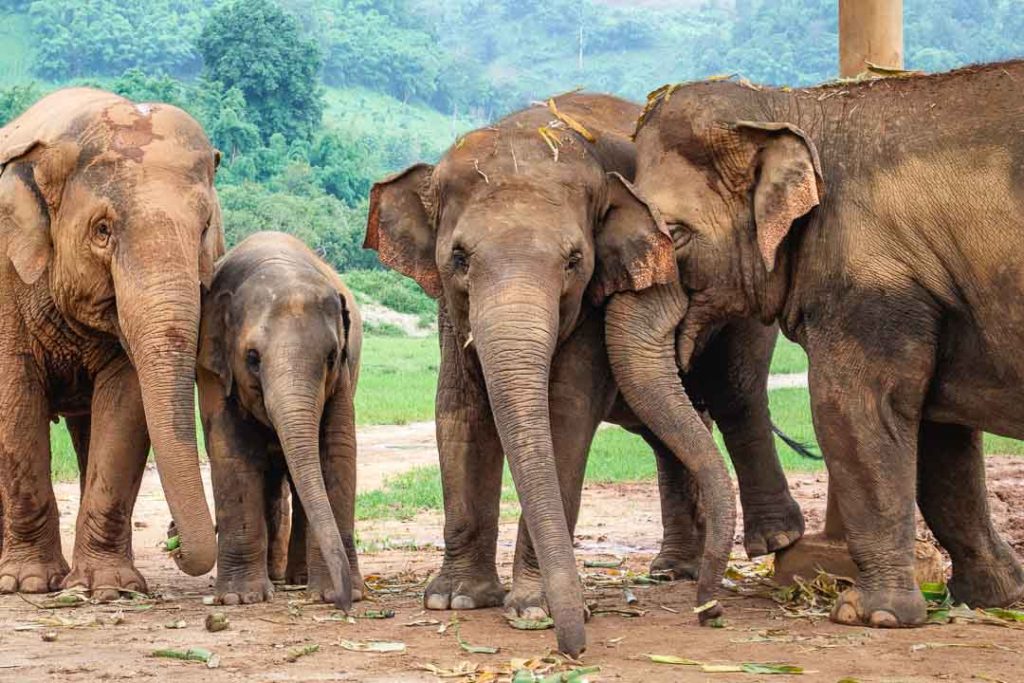
Elephant tourism is huge in Southeast Asia. I was excited to see and experience elephants, but I had no idea how terribly they’re abused so that tourists can enjoy them. By choosing an ethical elephant experience, we’re casting our vote on what kind of a world we want to live in. Lets vote against animal cruelty!
Don’t Ride Elephants!
But they are huge and we are so small! What’s wrong with riding elephants? Unlike domestic animals like horses, elephants are wild animals. It’s incredibly unnatural for elephants to let humans ride them, so they must be ‘broken’ first.
The ‘Phajaan’ means crushing the spirit of an elephant, and is a method of ‘taming’ wild animals with a restrictive cage and torture. The (baby!) elephant is immobilized, it is beat and pierced with bullhooks, and it is starved and not allowed to sleep. It is cruel and it is terrible. More information about the Phajaan can be found on Thailand Elephants, One Green Planet, and Save The Asian Elephant.
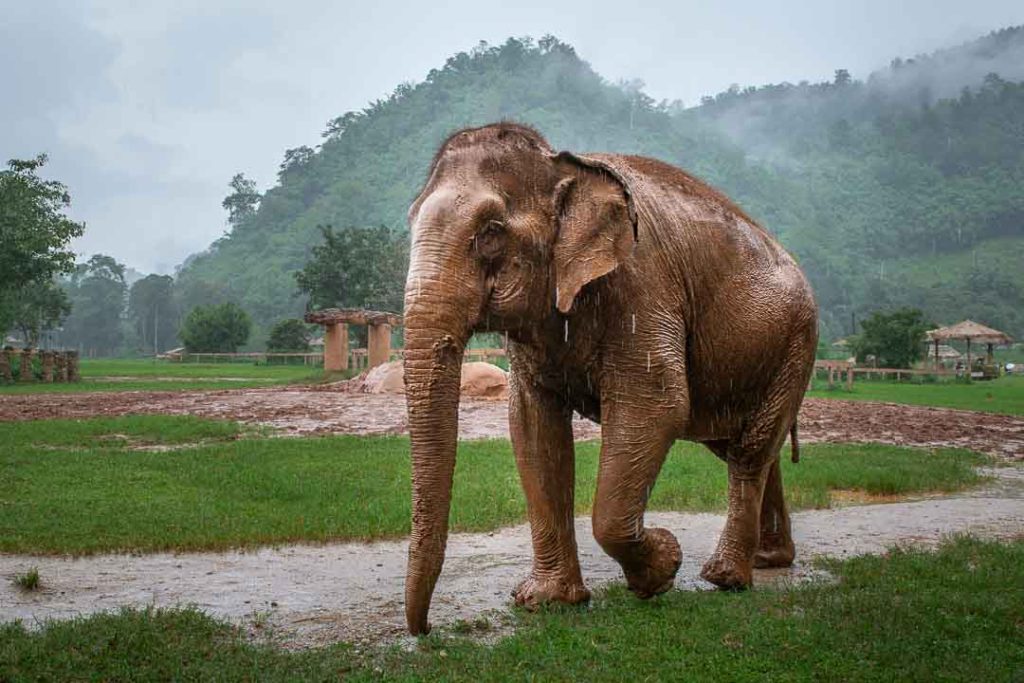
Don’t Pay for Elephant Tricks!
Similarly, don’t pay to watch elephants do tricks, paint paintings, or take pictures with elephants near tourist attractions or in cities. The elephants are similarly broken and abused, and obey out of fear. In addition, most elephants in the Asian tourism industry are held in severely cruel conditions, according to a study done by World Animal Protection (WAP).
How to Tell if an Elephant ‘Sanctuary’ is Ethical?
A lot of fake elephant ‘sanctuaries’ are popping up in Thailand as the demand for ethical animal tourism rises. So how can we tell if an elephant ‘sanctuary’ is the real deal?
An ethical elephant experience in Thailand will not let you ride on, play with, or wash the elephants. The elephants should be free to do elephant things: walk around, splash in the mud, and chew on stuff, mostly. There should absolutely be no bullhooks or other ways of hurting the animals.
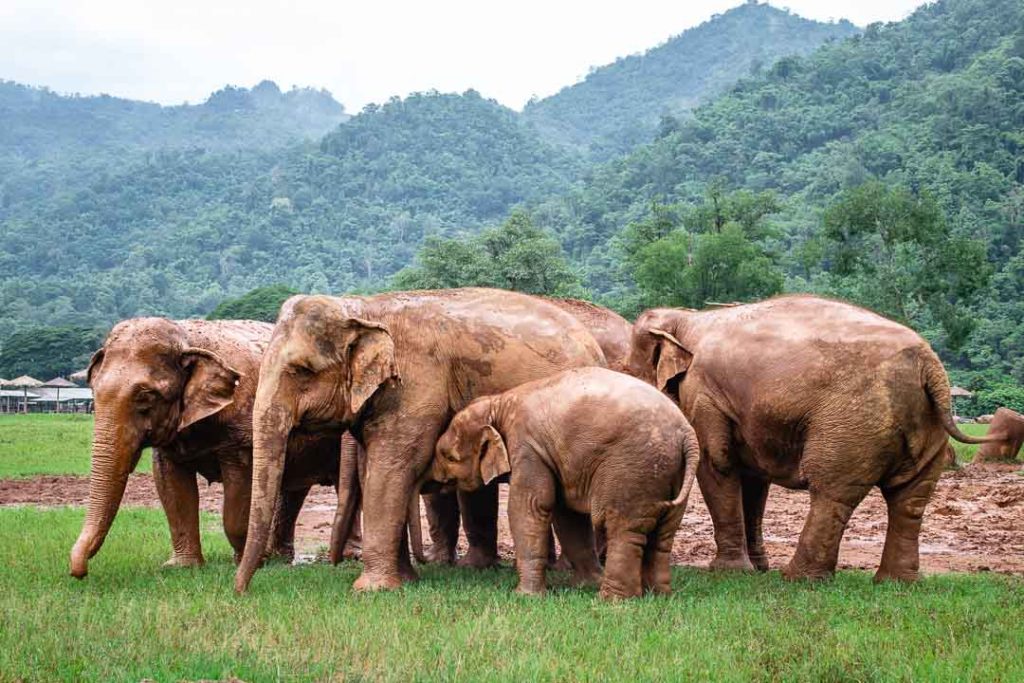
Elephant Nature Park Chiang Mai
Elephant Nature Park is an elephant sanctuary about an hour north of Chiang Mai in Northern Thailand. They rescue elephants that have been abused in the tourism industry, elephants injured in illegal logging operations, and elephants maimed in the wild by stepping on mines left over from military conflicts in Southeast Asia.
More than 70 elephants live on the 250 acre property. When an elephant is rescued, it is allowed to rest and recover from a lifetime of abuse. Eventually, it usually joins a family or finds a ‘best friend’ to keep them company. They spend the days with their family, free to roam the park as they please, accompanied by their mahout.
A mahout is an elephant keeper that has a special bond to the elephant. Mahouts let the elephants out in the morning, they accompany the elephant to make sure that they don’t leave the property, and put them away for the night. Many of the mahouts are retrained in the ethical treatment of elephants, since mahouts often learn to control elephants with bullhooks. Many of them are refugees from Burma, and Elephant Nature Park helps them with housing and schools for their children.
Elephant Nature Park is also home to several hundred dogs and cats rescued from a flood in Bangkok, and a herd of water buffalo! The park is involved in rain forest restoration, and supports the local economy by buying local agriculture and hiring locals when possible. You’re surrounded by animals and people who care about animals, their community, and the environment.
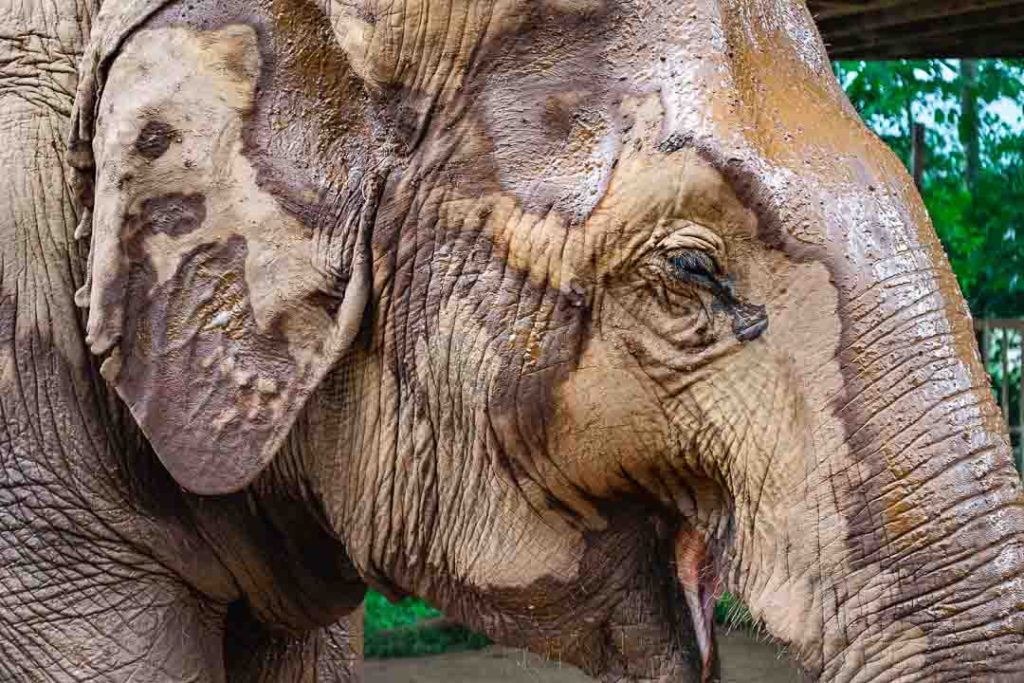
Concerns about the Elephant Nature Park
Some concerns about the Elephant Nature Park include tourists being able to feed the elephants, and elephants being locked in enclosures overnight.
Feeding the elephants is not natural wild elephant behavior. However, the elephants that tourists feed are the older elephants who don’t display any signs of distress from being fed by humans. If an elephant wants to stay away from people, that is respected.
Although the elephants can roam free during the day, during the night they are locked up in enclosures with their families. How is this ethical? The land that Elephant Nature Park is on is unable to be completely fenced in. At night, the elephants would leave and get into agricultural fields full of pesticides.
While the end goal is a total hands-off, free-roam environment, they are working within their means as they progress towards their ultimate goal.
Volunteering at the Elephant Nature Park
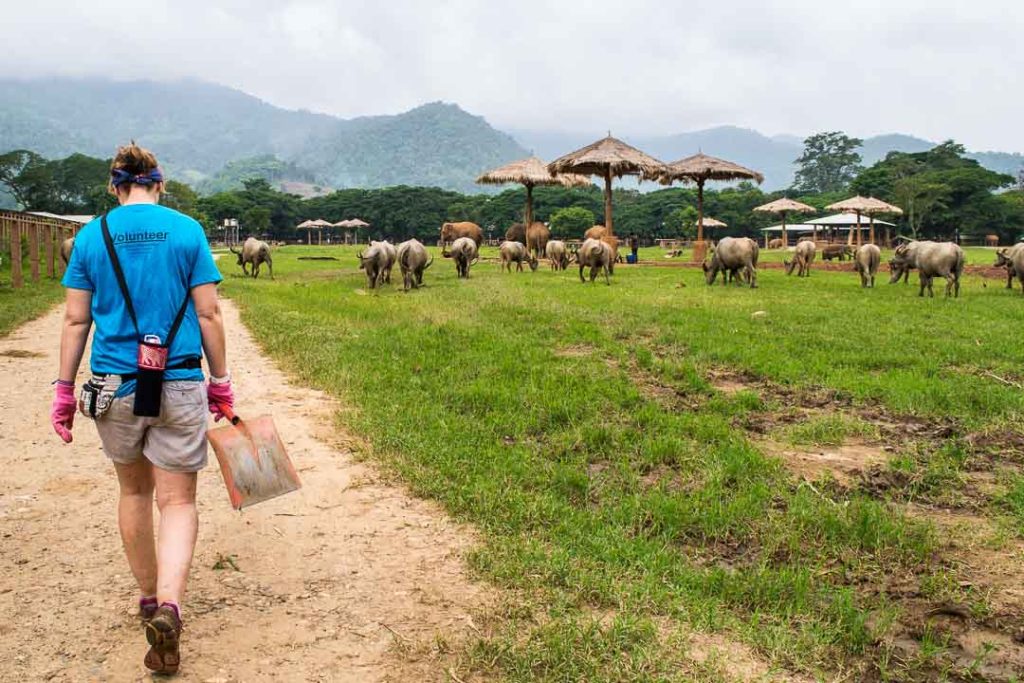
You can volunteer at the Elephant Nature Park for one or two weeks (for two weeks, book two consecutive stays separately). You get to live and work in the park, and spend all of your free time staring at elephants! Or whatever you like to do, but come on, you’re going to spend it staring at elephants!
Volunteer Accommodations at the Elephant Nature Park
Included in your experience is 6 nights of lodging. The lodging at the Elephant Nature Park is basic but practical. You get a roommate and a shower. The beds have mosquito nets, and there’s a ceiling fan for cooling purposes. There’s electricity, and… that’s about it! You use your room for sleeping, showering, and changing. The rest of the time you spend in the common areas.
Food at the Elephant Nature Park
Volunteers at the Elephant Nature Park get three meals a day. The food is plentiful, delicious, and vegan! There are a crazy amount of dishes to choose from, and it’s served all-you-can-eat buffet style, so there’s no need to get scared and grumpy. (anyone else get angry and competitive at small portions? sorry travel companions!!)
Maybe the one tiny complaint I have is that the coffee isn’t that great? And I have like, no standards. I still drank it of course, who am I kidding. For people with more refined taste buds than me, however, there’s a coffee shop with coffee drinks and smoothies that are delicious!
What Kind of Work do You do at Elephant Nature Park?
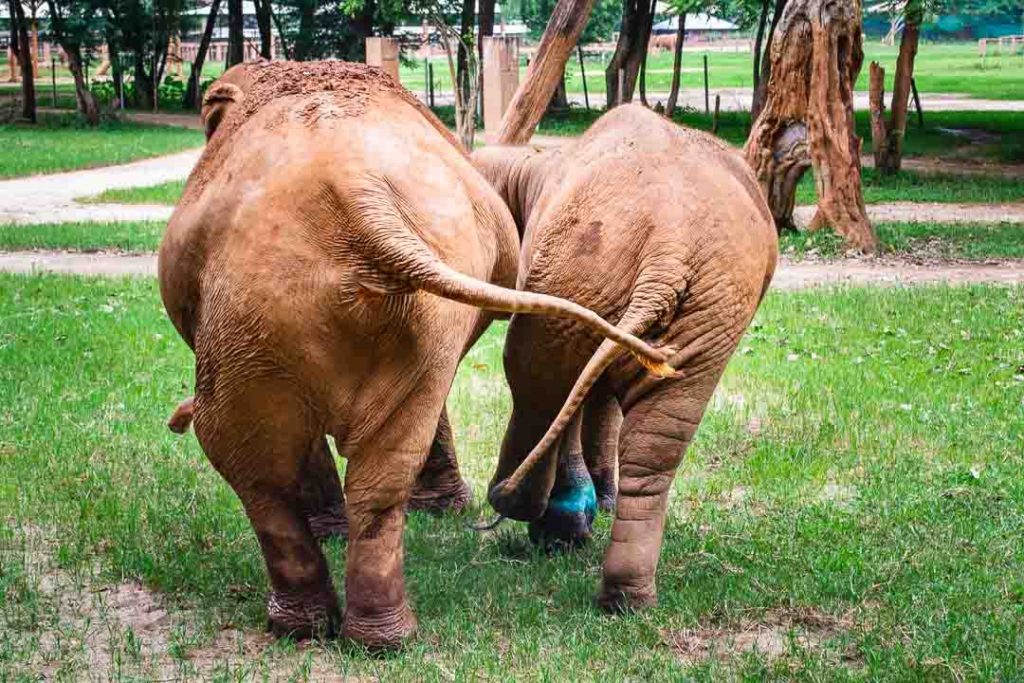
Prepare to get really familiar with elephant poop!!!
There are 2 to 3 hours of work in the morning, and another 2 to 3 hours of work in the afternoon. The morning work is primarily shoveling elephant poop. You walk around to the elephant enclosures, and then to places where the elephants hang out, and shovel all the elephant poop into carts. The work is physical, but not long enough to be taxing for someone of an average fitness level. The poop is like horse poop but larger, so I didn’t find it gross at all.
In the afternoon, there will usually be elephant kitchen work. We moved pounds and pounds of bananas and melons into storage.
Once a week you will go out and work on a project outside of the park: we planted grass in a field, which was the hardest task of the whole week. We came together and got it done, although we heard of another group refusing to do the work because they were ‘volunteers’. Please don’t do that!! I was so embarrassed for them!
Overall, the work is physical, but the intervals short enough that it wasn’t very hard to do. Everyone in my group was happy to be there and work among the elephants, and we had fun doing it!
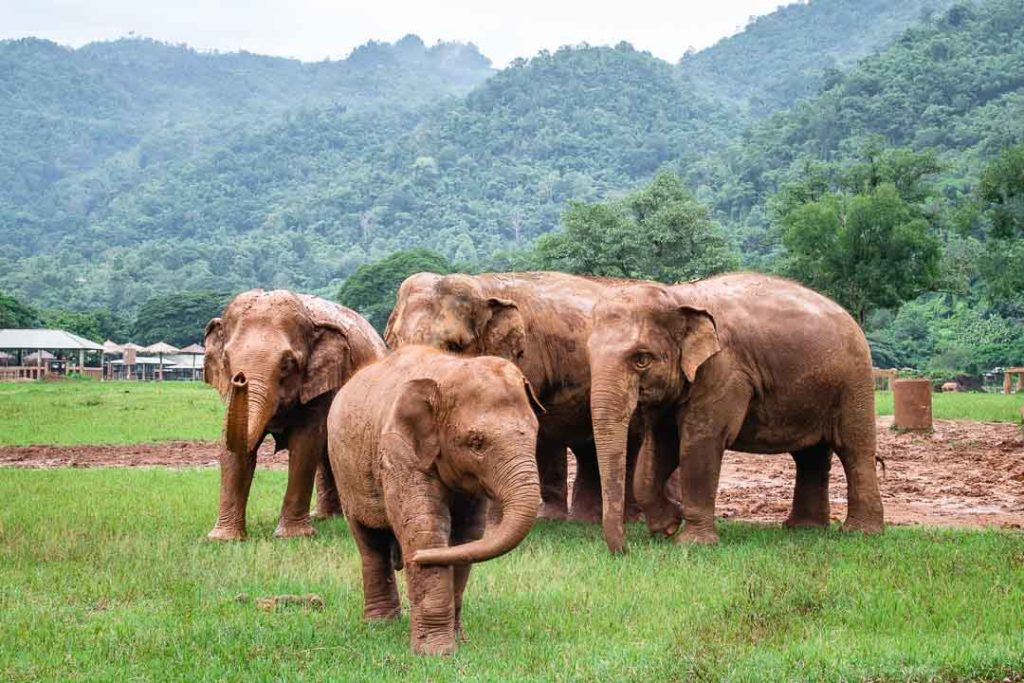
Volunteering with Dogs at the Elephant Nature Park
Another program available at the Elephant Nature Park is volunteering with the several hundred dogs who live there. The dogs were trapped on rooftops in a flood in Bangkok in 2011, and were rescued and housed in the Elephant Nature Park. Dog volunteers stay at the park and are charged way less then elephant volunteers, so it’s also a great budget option to stay at the park.
For elephant volunteers, there is time between work to also volunteer with the dogs, which I highly recommend. They need all the help they can get.
In the morning, we went and just sat in dog enclosures for the dogs to get used to human interaction and contact. Some dogs would run over for pets right away, and some would hide as far away as they can. I remember one time we just sat in an enclosure for 45 minutes and at the end, the dog there gathered up the courage to come up behind us and sniff us. This was a huge victory!
In the afternoon, volunteers take the dogs out on walks around the park, and sometimes that is the only walk the dogs can get that week! The dogs might not be as majestic as the elephants, but they could also use some love. I encourage you to volunteer with the dogs at least a couple of times during your stay at the Elephant Nature Park.
Volunteering at the Elephant Nature Park: Free Time
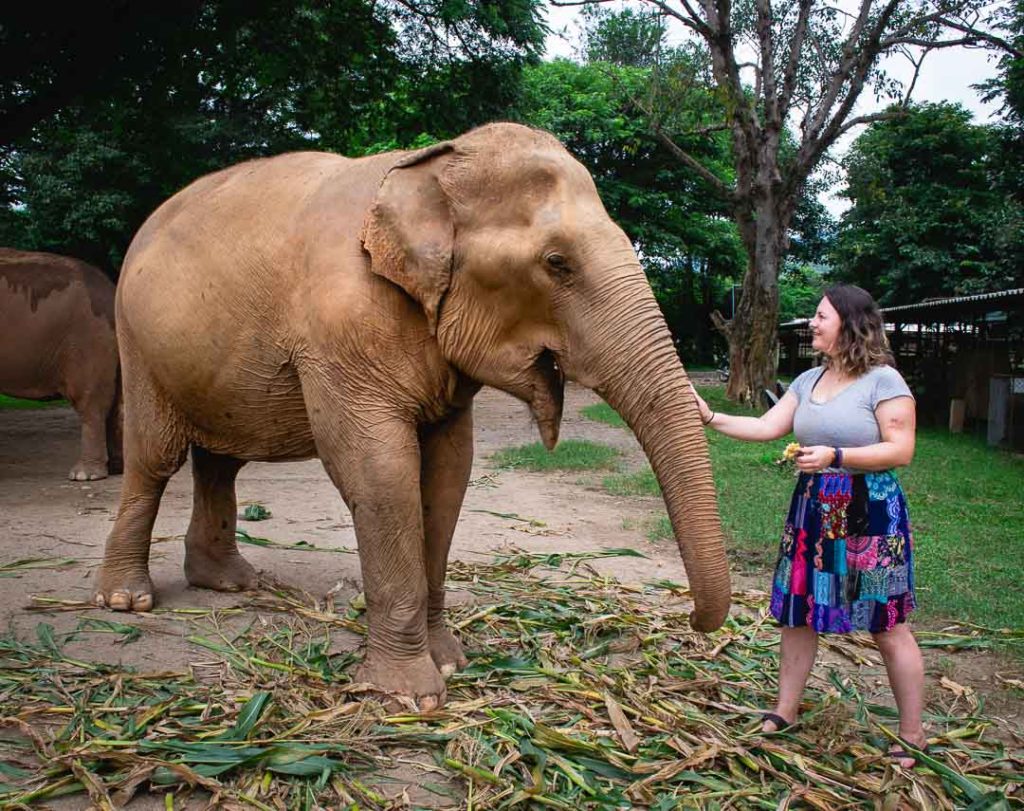
There is a lot of free time for volunteers at the Elephant Nature Park. I spent a lot of it on the elephant observation bridge: an elevated structure in the park from which you can watch the elephants bathe, roll around in mud, and chew on corn stalks.
You can also buy a beer or a smoothie and hang out above the dining room, also overlooking the park. Bring a book, chat with new friends, or gawk at the verdant scenery of Northern Thailand.
In the evening, women from nearby villages come and you can pay for massages (highly recommended). The massages are awesome, and you also get to support the local masseuses who would otherwise have to travel to a larger city to get enough customers.
Some nights there are performances, including a dance group by the local women. They contained a range of experience levels and ages, and it was pleasure to watch! My favorite night, however, was the mahout band! The usually reserved faces of the elephant keepers were animated as they beat homemade instruments and played their recorders. The performance was full of humor and good vibes.
What to Pack for the Elephant Nature Park
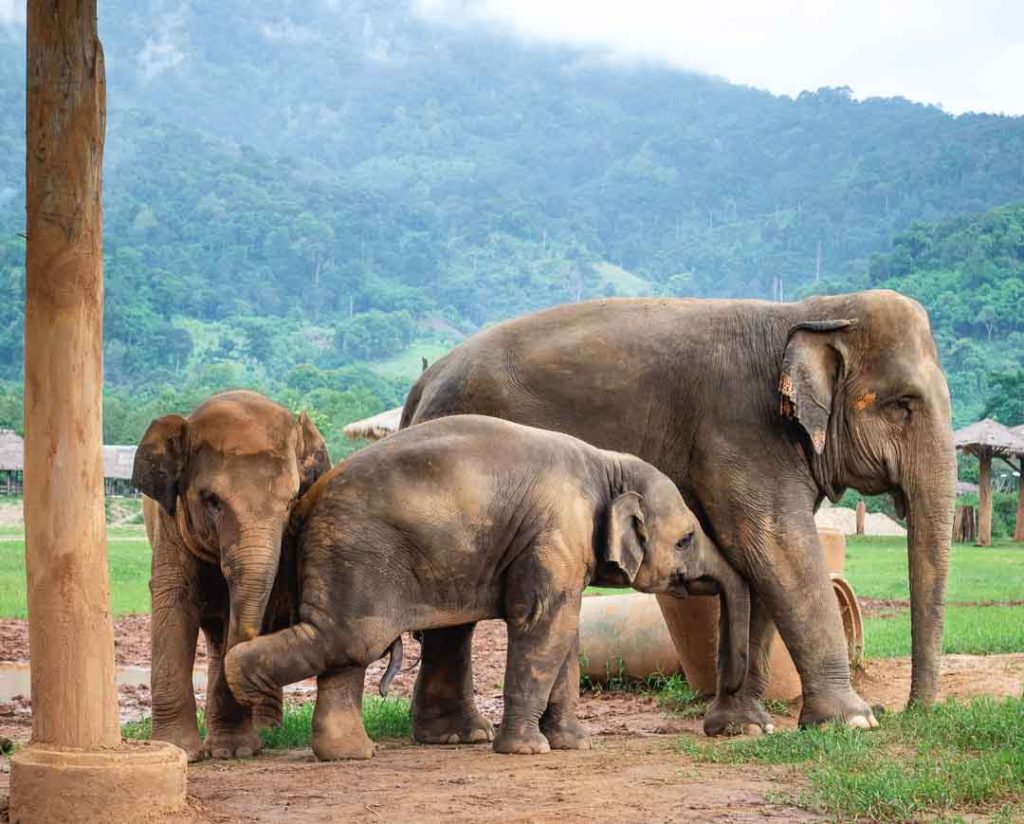
A general Southeast Asia packing list will do great for the Elephant Nature Park. One item that I didn’t have but wished I did is a pair of Wellies or rain boots, especially for the rainy season. We walked across wet grass or mud while shoveling elephant poop, or just exploring the park. My sneakers got wet and muddy, and the worst part was that it was too humid for them to ever completely dry. Ugh.
I’ll also emphasize that bug spray, sun screen, and a hat are extra important. Many people got burned working under the unfamiliarly intense sun.
And don’t forget some cash for beer and smoothies, massages, and souvenirs.
How Much Does it Cost to Volunteer at the Elephant Nature Park?
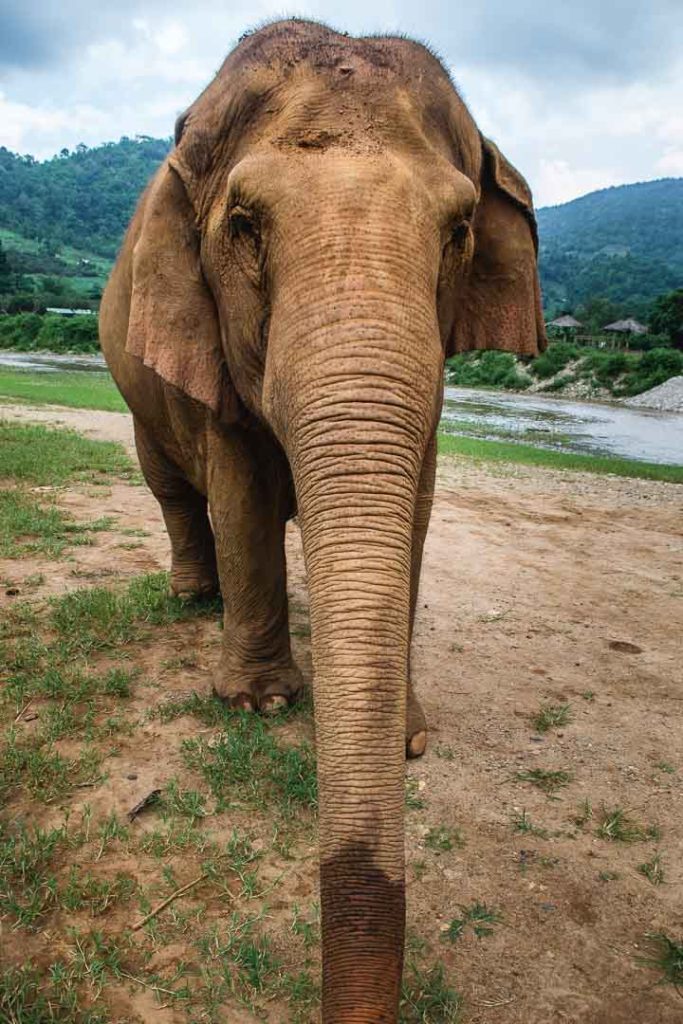
Wait, I have to pay to shovel elephant poop?
Well, yes. The money pays for your food, lodging, and transportation to and from the park. Moreover, it pays for food and medicine for the elephants, upkeep of the park, and the purchase of abused elephants from their owners.
If tourists are willing to pay for ethical elephant experiences in Thailand, then there will be less demand for elephant riding and other harmful elephant tourism. We are essentially voting with our money on how we want elephants to be treated.
A week of volunteering with elephants costs $365 per person. This was definitely one of our bigger ticket items on our 3 month itinerary through Southeast Asia, but also one of the most memorable ones. You can find out more about out budget for 3 months in Southeast Asia here.
Is it Worth it and Final Tips
One final tip I have is to book ahead as early as possible! Spots fill up fast, and we ended up hanging out in Chiang Mai longer then we planned.
Was the experience worth it? Hell ya! I would 100% do it again, and i wholeheartedly recommend it to anyone interested in volunteering with elephants in Thailand. Being an elephant sanctuary volunteer was something I’ll never forget. If you like elephants, beautiful places, awesome people, and helping to make the world a better place: go do this!!
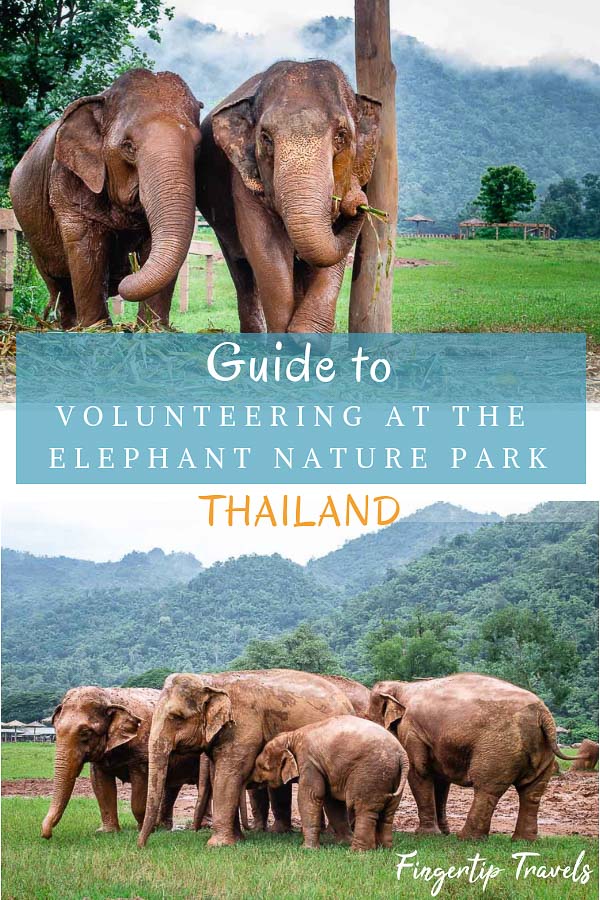












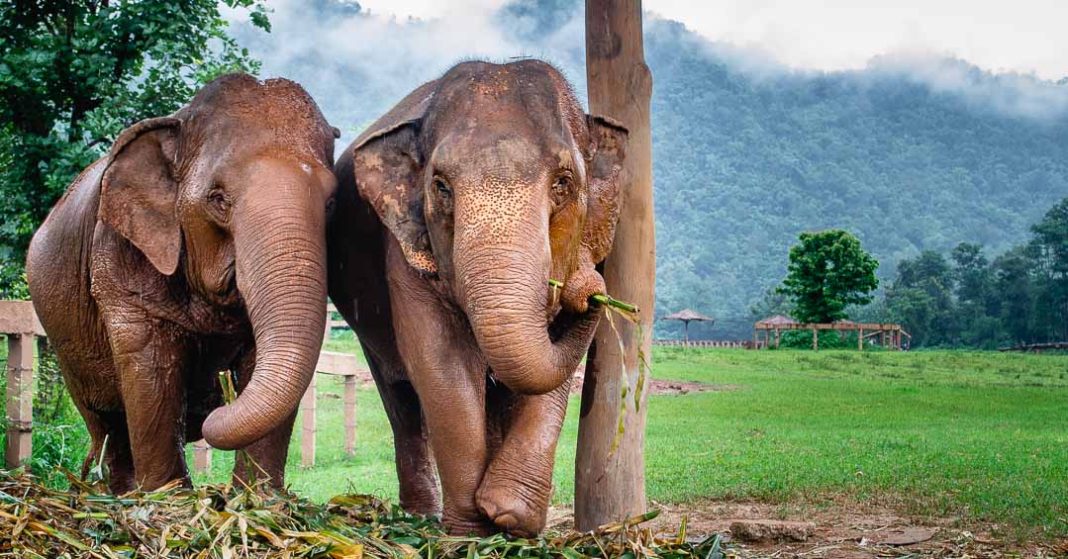








This is such a beautiful post! I love elephants too and it is such a privilege to be a part of their rehabilitation. It it really awesome to hear that the mahouts and their families are looked after by the sanctuary, it is easy to forget that as we move towards ethical animal encounters ters we need to look after people and help them move with the industry as well.
Yes totally!! It’s so easy to view the people supplying the unethical animal tourism as evil, but they’re only filling a demand created by tourists willing to pay money for these things, as they have a family to feed as well!
Awesome post! I love elephants, and it’s amazing that you were a part of the rehabilitation. I would love to volunteer here next time when I’m in Thailand. Thank you for sharing 🙂
<3 I absolutely love your post. Thank you for being an ethical traveller and sharing your experience. I've visited the Elephant Jungle Sanctuary when I was there and it was quite interesting (no riding, of course) back in 2015. I honestly thought it was an ethical sanctuary but we did interact with the elephants by swimming with them in the watering hole on the land but there was nothing that I could visibly see that was hurting the animals… I guess it still might've been a "fake" sanctuary from your explanation (the playing and swimming bit)? 🙁 I feel so terrible now but at least I know!
I did remember them telling us about how they have to lock up the elephants at night because of the pesticides and neighbouring farms so I'm glad you addressed that! Really a great and informative post!
Hey! The Elephant Nature Park included washing the elephants until a bit ago. Apparently when it was announced that that’s no longer an option, a bunch of people canceled their trips! 🙁 I asked about why it’s not recommended, and they said that the elephant’s skin dries with too much washing, and they like to put mud on themselves, which protects them from the sun.
It’s a learning experience for all of us! While bathing them is not ideal, it’s still way better than riding them and paying for tricks! I also think we can look at elephant sanctuaries on a spectrum, not some perfect and the rest fake. I was mostly referring to the ‘sanctuaries’ which purposefully trick tourists by using the right vocabulary, but don’t put any effort into ethical animal treatment!
This is amazing. You’re really making me want to go volunteer with the dogs. And the elephants, of course! I have a friend visiting Thailand right now and I think this would be right up her alley, so I’m going to send her your post. I really love seeing people write about how to visit with elephants ethically, since there are so many shady places out there.
Thank you so much! 🙂